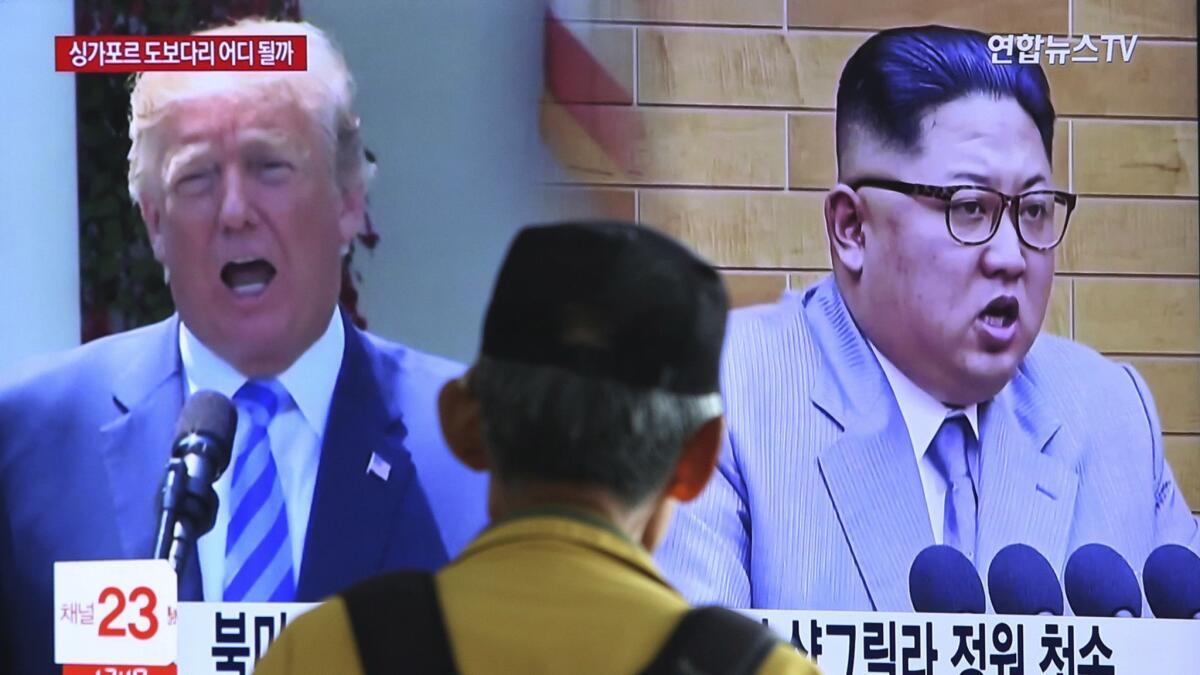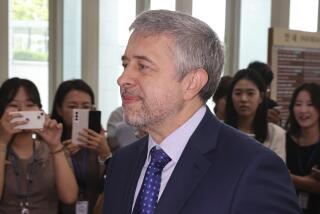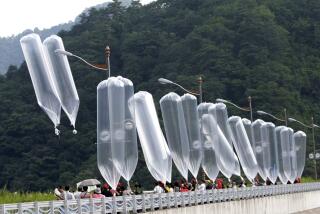North Korea postpones talks with South and protests U.S. military exercises

- Share via
Reporting from Seoul — After weeks of warming relations, North Korea on Tuesday abruptly postponed scheduled talks with South Korea to protest U.S.-South Korean military exercises, but the Trump administration downplayed the development, saying it was continuing to plan for next month’s summit with North Korean leader Kim Jong Un.
In a statement, North Korea’s official Korean Central News Agency denounced the exercises, which began Friday, as a “deliberate military provocation” designed to disrupt the “favorably developing situation on the Korean peninsula.”
The air force exercises were an “undisguised challenge” to the joint declaration that Kim and South Korean President Moon Jae-in signed last month in Panmunjom, the so-called truce village in the demilitarized zone between North and South, the North Korean statement said.
“The U.S. will have to think twice about the fate of the DPRK-U.S. summit,” the statement said, using the initials of North Korea’s official name, the Democratic People’s Republic of Korea.
Whether the statement reflected a serious change of course on Kim’s part or just a temporary shift in rhetoric remained unclear.
Get the latest news from the nation’s capital on Essential Washington >> »
The North has criticized U.S.-South Korea military exercises for years, often in far more bellicose language than it used in Tuesday’s statement. But its complaints have remained muted in recent months.
In the past, the North has used the exercises to justify additional ballistic missile tests and provocative behavior, said Timothy Rich, an associate professor of political science at Western Kentucky University whose work focuses on East Asia.
“I could certainly see this as a negotiation strategy on North Korea’s part to paint the U.S. and South Korea as acting against good faith,” he said. “The challenge now is to determine what North Korea wants to return to the table or if this was a planned umbrage to deliberately slow down dialogue.”
Scott Snyder, a senior fellow for Korea studies and director of the program on U.S.-Korea policy at the Council on Foreign Relations, said North Korea’s decision to “play hard to get” ahead of the summit shouldn’t be a surprise.
“North Korean behavior is reverting to form,” he said. “There will be threats to pull the plug on both sides before Kim and Trump actually meet.”
Relations may also have been inflamed by Thae Yong Ho, a top North Korean diplomat who defected in 2016 and has been making the media rounds in Seoul in advance of his new book. He gave a talk at the National Assembly last week in which he speculated about Kim’s plans for the North’s economy, among other things.
The North Korean statement accused the South of allowing “human scum to brazenly hurl mud at the dignity of the supreme leadership of the DPRK … in front of the building of the National Assembly.”
The statement came the day the North and South were expected to hold another round of talks at Panmunjom. That meeting was “indefinitely postponed” by the North, according to South Korea’s Unification Ministry.
The negotiators were to include Kim Jeong-ryeol, the South’s vice transportation minister, and Kim Yun Hyok, the North’s minister of railways, suggesting the two sides might explore ways to improve cross-border travel.
Other negotiators were to include officials on both sides with responsibility for unification issues and sports. The two countries have been exploring opportunities for combined sports participation, perhaps at the upcoming Asian Games in Jakarta, Indonesia, that would be modeled after the joint hockey team they fielded at the recent Winter Olympics.
Trump administration officials brushed aside the North’s comments, noting that Pyongyang had not made any direct comment to the Secretary of State Mike Pompeo when he traveled to North Korea this month and met with Kim to prepare for the scheduled June 12 summit in Singapore.
“The United States will look at what North Korea has said independently and continue to coordinate closely with our allies,” White House Press Secretary Sarah Huckabee Sanders said when asked about the North Korean statement.
Trump’s nominee for CIA director wins key Democratic support, virtually assuring her confirmation »
At the State Department, spokeswoman Heather Nauert said the military exercises should not be problematic for North Korea, nor a surprise.
“What we have to go on is what Kim Jong Un had said before, that he understands and appreciates the importance to the United States of having these joint exercises,” Nauert said. “We’ve received no formal or even informal notification of anything.”
She said plans for the summit continued.
The joint air force drills, called Operation Max Thunder, are scheduled to last two weeks.
At the Pentagon, officials defended the exercises.
“While we will not discuss specifics, the defensive nature of these combined exercises has been clear for many decades and has not changed,” spokesman Col. Robert Manning said.
Lauter reported from Washington and special correspondent Stiles from Seoul. Staff Writer Tracy Wilkinson in Washington contributed to this report.
For more on Politics and Policy, follow me @DavidLauter
UPDATES:
4:59 p.m.: This article has been updated throughout with staff reporting, quotes and analysis.
This article was originally posted at 12:35 p.m.
More to Read
Sign up for Essential California
The most important California stories and recommendations in your inbox every morning.
You may occasionally receive promotional content from the Los Angeles Times.











